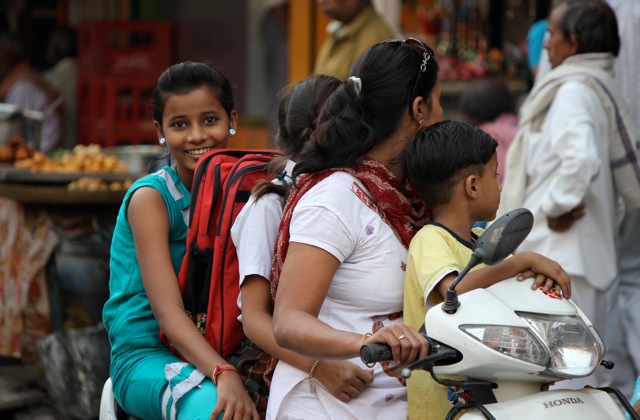“Being there really helps if you want to see illusion.” -Kathy Sage
The last steps of our pilgrimage take us to the state of Bihar. Once the most corrupt and poorest state in India, with approximately 80% of its leaders having served jail time, it is currently on an upswing. The town of Bodh Gaya is where it is said that the Buddha was enlightened after sitting under a bodhi tree. Legend has it that King Ashoka’s wife, jealous of his Buddhist obsessions (she also lost her son and daughter to the path) chopped the famous tree down. Luckily for those pilgrims that revere the tree, the son had taken a cutting to Sri Lanka where it flourished. Ultimately, someone else brought back another cutting and planted this child of the original in the same spot. A huge stupa marks the spot of the Buddha’s awakening, reaching into the sky. The stupa reminds me of the movie 2001: A Space Odyssey. The towering monolith was almost blown up by Islamic extremist a few months ago.
Bodh Gaya is also a haven to beggars of all kinds, those who have been afflicted by polio, leprosy or lifelong poverty. Our guide; Mr. Feldman, has instructed us not to give to children who come at us with their hands out miming the eating of food, sad-faced. Heartless, you might think? One risks being mobbed and since there is never enough to go around the children will attack each other fighting for whatever has been given. It is far better to give to known organizations so one is assured that the gifts are not wasted by inadvertently being used to grease someone’s palm. Bribes and other forms of corruption are rampant. Lastly, giving to children who have been sent out by their parents or more nefarious sources to beg on the street perpetuates a culture of begging for life and the kids don’t get an education. And education is the way out of poverty and ignorance.
The caste system is alive and thriving in India. Brahmins are at the top of the heap (though they too may be poor) and the Dalits (untouchables) are at the bottom. The Dalits are given the worst jobs (heaping wood onto funeral pyres or making the dung patties used to start cooking fires). They are considered non-caste, outcasts. This is a system that has been in place for thousands of years. The Prajna Vihar School for children in financial need–regardless of caste–is taking a stand for integration and the breaking down of caste barriers. The school survives on donations and is run by Sister Shoba, a nun with a tight and ethical fist.
We go to the school and witness the results of 25 years of work. It is perhaps the cleanest space I’ve seen in India. Most of the children continue their education after completing grade 10 here. It is nothing like the government school (where the teacher sleeps or spits paan all over the walls and floor of the class room) I have read about in Arvinda Aviga’s book, White Tiger; a humorous and angry must read about life in India. The children are engaged, bright, well groomed and helpful. Outside the walls other children peer in, wanting to be included. Unfortunately, either their parents have not applied, the children don’t qualify for acceptance or there is simply not enough space for them.
It is easy to close our eyes and hearts to the suffering that is here, to revert to the emotional safety of separation when the pressure to give to those whose need is beyond anything we ever see in the west becomes overwhelming. It is painful and horrific by our standards. But if we can stay open without being overcome we can bring compassion, patience and equanimity to these interactions with those whose want is unending and who have so little. How can we stay present in the midst of all of this? We can work to bring wise attention to these exchanges, seeing our common humanity versus seeing only our differences. We can bring wise effort to the alleviation of suffering should we choose to do so. By bringing kindness and compassion to these meetings with others we also help ourselves. It is well known that there is a correlation between happiness and an increase in concern for others (which also means a reduction in self concern).
So, as we sit with Sister Shoba we discover that her teachers earn $1100 CAN per year. The English books she needs cost $2.50 each (less than the price of a latte) and the toilets she wants to build for the female students are $500 each. So, for now, when I see a person’s hand reaching at me with or without fingers I think of those 500 children at the Prajna Vihar School. I imagine this is wise effort when I make the choice to put some energy into a greater impact and a hope for change with these children. Still, sometimes the rupees go to the beggar if she is an aged woman or disabled person, and sometimes I stop seeing them as people due to my own limitations or sense of being barraged. But then, I can begin again.
In the words of Rumi, this being human sure is a “guest house….every moment a new arrival.” In India, you never know what will be around the corner: a most welcome or unwelcome surprise. Guard the sense doors. That is, be vigilant about to what you attend or engage with in any way, but also be open lest you miss the lessons that India has to teach about what it means to be a sentient being.


